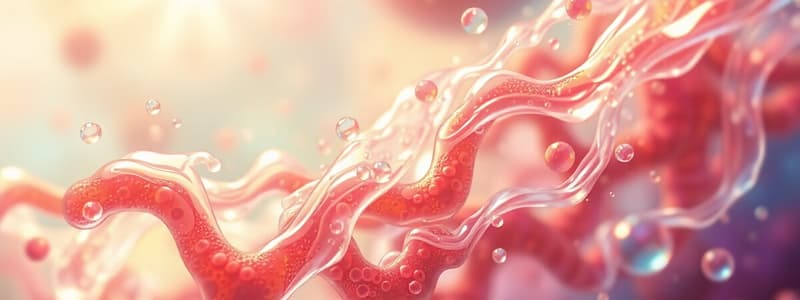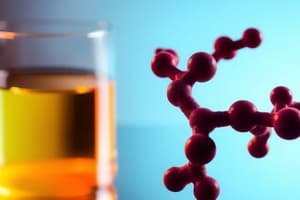Podcast
Questions and Answers
A solution with a pH of 2 is _________ times more acidic than one with a pH of 5.
A solution with a pH of 2 is _________ times more acidic than one with a pH of 5.
- 100
- 10,000
- 1,000 (correct)
- 10
All of the following are correct about enzymes EXCEPT
All of the following are correct about enzymes EXCEPT
- they are proteins
- they denature at high temperatures
- enzymes are not normally degraded during a reaction
- enzymes produce energy in reactions (correct)
Which of the following is NOT a characteristic of water?
Which of the following is NOT a characteristic of water?
- Water is a universal solvent.
- Water exhibits strong cohesion tension.
- Water has weak hydrogen bonds. (correct)
- Water has a high specific heat.
Which statement about the pH of blood in humans is correct?
Which statement about the pH of blood in humans is correct?
Which of the following is NOT a carbohydrate?
Which of the following is NOT a carbohydrate?
Which of the following is NOT a polysaccharide?
Which of the following is NOT a polysaccharide?
Which of the following is correctly matched?
Which of the following is correctly matched?
Isotopes differ from each other only in
Isotopes differ from each other only in
All of the following are correct about enzymes EXCEPT
All of the following are correct about enzymes EXCEPT
A polysaccharide found in plants whose function is storage is
A polysaccharide found in plants whose function is storage is
Flashcards are hidden until you start studying
Study Notes
Acidity and pH Levels
- A solution with a pH of 2 is 1,000 times more acidic than one with a pH of 5, demonstrating the logarithmic nature of the pH scale.
Enzyme Characteristics
- The mechanism of enzyme action is commonly described by the "lock and key" model.
- Enzymes are proteins that can denature (lose structure and functionality) at high temperatures.
- Enzymes often require vitamins and minerals as cofactors for optimal activity.
- They generally are not degraded during the reactions they catalyze.
Properties of Water
- Water is a molecule with significant cohesion due to hydrogen bonding.
- The covalent bonds in water are polar, leading to strong intermolecular attractions.
- Water and lipids do not mix because of the polarity difference; water is polar while lipids are nonpolar.
- Contrary to some claims, there is strong attraction between water molecules.
Characteristics of Water
- Water has high specific heat, high heat of vaporization, strong cohesion, and is less dense than ice, which allows ice to float.
- Water is known as a universal solvent due to its ability to dissolve many substances.
pH of Blood
- The pH of human blood is normally around 7.4 and is known to resist drastic changes.
- It is highest at birth and gradually decreases to a minimum level over time.
Carbohydrates
- Insulin is not a carbohydrate; it is a peptide hormone.
- Glycerol is not a polysaccharide; it is a sugar alcohol used in lipids.
- Polysaccharides include cellulose, glycogen, chitin, and starch.
Biological Molecules
- Nucleotides make up nucleic acids (DNA/RNA), not proteins.
- Proteins, lipids, and carbohydrates each have distinct building blocks; carbohydrates are not made of amino acids but of sugars.
Isotopes
- Isotopes are variants of elements that differ in the number of neutrons, affecting atomic mass, but not chemical reactivity.
Enzyme Functionality
- Enzymes are organic catalysts that lower the activation energy for chemical reactions.
- They are affected by both temperature and pH changes, which can alter their activity.
Storage Polysaccharides
- Starch is the primary storage polysaccharide found in plants, while glycogen serves this purpose in animals.
Protein Structure
- The tertiary level of protein structure relates most directly to a protein's overall shape and function.
Medical Uses of Radioisotopes
- The radioisotope I-131 is utilized primarily in medical diagnoses and treatment related to the thyroid gland.
Studying That Suits You
Use AI to generate personalized quizzes and flashcards to suit your learning preferences.




